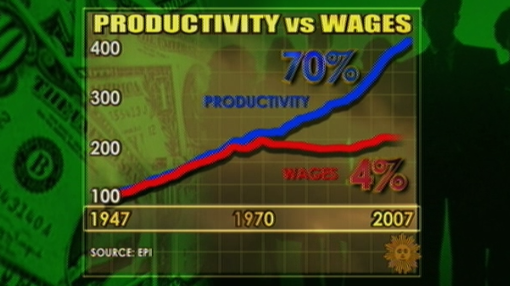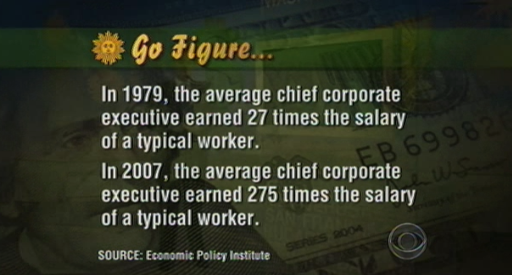Fair warning – this may end up being one of those long, whiny political posts, so if you aren’t into that sort of thing, just skip down to the next post. But if you are interested in my perspective of things, I’ll do my best to rationally and constructively explain myself. Either way, I’m sure I’m going to be called some names, but sometimes I just want to throw some stuff out there.
As many of you know, I love watching CBS Sunday Morning. Yes, I attend church (well, most of the time) so I end up recording it on the DVR so I can watch it later in the day. I like to describe it as NPR for TV, I always feel a bit more cultured, educated, and enlightened after watching it.
Yesterday they had a segment about the American salary. You can read an abbreviated version of the segment here, but I posted the entire segment on YouTube that you can watch below if you are interested.
A few parts of the segment got my attention, but these two screengrabs really stood out.
Per the graph, as productivity increased, so did wages, up to around somewhere in the seventies. The video states the year 1979, but the summary article I linked to above states “around 1970.” So sometimes in the seventies as productivity increased, wages for the typical worker did not, but the salary of wages skyrocketed.
So what happened around that time to cause executive compensation to increase and workers to level off even as productivity increased? Tax cuts for corporations, and this is the reason why I’m not a big fan of the corporate tax cut. Many of my conservative friends will argue that corporate tax cuts will allow businesses to grow and add more workers, and that the income made by the wealthy create jobs for the middle and lower class. But here’s my take . . .
When corporations receive a tax cut, instead of using those extra funds to grow the company or hire more workers, those funds are instead used to increase the salaries of the executives in charge, which both of those screengrabs above support, which means that the rich only get richer while the middle and lower classes are stuck in a curmudgeon.
As for the argument that the income of the wealthy create jobs for the middle and lower class, I can’t completely refute that rationale. However, it’s my thinking that if the exuberant salaries were diverted from the executives to the workers, the middle and lower class, then the buying power of both of those classes would benefit the economy, and that the increased buying power of those two large classes would be better for the economy than that of a smaller wealthy class that purchases luxery goods.
Some may argue that if stockholders are upset at the salaries that are being paid to the executives are outlandish, then the stockholders would display their anger. That’s another argument I can’t agree with since the major shareholders of these companies are insurance and mutual fund giants – people that are all in the same club (probably country club). Once again, the middle and lower class are stuck in a curmudgeon.
I have a feeling some of you are calling me nothing more than a bleeding heart liberal and a socialism lover, but that’s not my intent as I type this at an hour in which I should be asleep. I love capitalism, but I think the tax laws just favor the corporations more than they do the individual, and unjustifiably so.
You certainly don’t have to agree with anything I said, but I hope I was able to express my perspectives regarding these issues in a rational, constructive and non-offensive manner.


